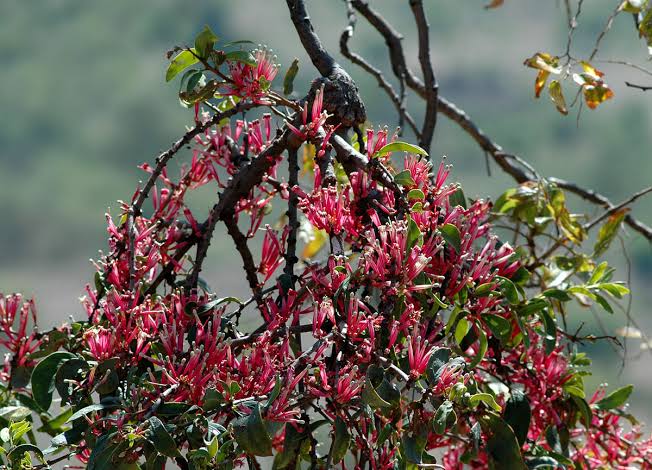The African Mistletoe (Tapinanthus dodoneifolius) is a plant that bears semblance to the mistletoe found in parts of Europe and Asia. It is a hemiparasitic plant, meaning it grows on parts of other plants or trees, known as the host. Some common hosts of the plant include the shea tree, neem tree, orange tree, cocoa tree, and so on. The designation ‘hemiparasitic’ denotes that the mistletoe depends on its host for some things but not everything. For example, it carries out photosynthesis by itself but relies on its host plant for water and minerals.
African Mistletoe is rich in glycosides, antioxidants, and flavonoids.
When people think of mistletoe, they often think of the tradition associated with it, which involves kissing someone under the mistletoe during Christmas or New Year celebrations. But the plant has more uses than just decoration for the holidays. The African mistletoe has a lot of health benefits that are worth knowing, and we would be looking at them below.
1. Might Be Used To Prevent Cancer
The African mistletoe contains anticancer properties, which has made it a local cure for cancer. It is one of the most researched plants for cancer cure. It is thought to boost the immune system to fight cancer. Even though no medical body has approved the use of mistletoe for treating cancer, this has not stopped people from seeking it as a treatment for cancer.
2. Manage Anxiety And Stress
African mistletoe can be used to manage anxiety and stress. It helps to improve sleep quality and reduce depression. These days, the mistletoe plant can be packaged into tinctures, teas, infusions, and extracts, to make it easier to consume. According to one report, “the chemical components in this herb may promote the release of neurotransmitters, like dopamine, to support restful sleep.” The plant also has calming effects on anxiety, making it easier for the individual to relax.
3. Boosts The Immune System
Studies show that the African mistletoe plant has antioxidant properties. Antioxidants help to fight off free radicals in the body. Free radicals can contaminate the cells and make them cancerous. Antioxidants also strengthen the immune system, making the body more resistant to infections and diseases.
4. Anti-inflammatory Properties
The mistletoe plant also has anti-inflammatory properties, which makes it effective in treating inflammation. Inflammation is the body’s response to an infection or injury. People have been using African mistletoe for reducing inflammation for centuries. Medical reviews have attested to the anti-inflammatory properties of African Mistletoe.

5. Might Help Manage Diabetes
The mistletoe plant can also be used to manage diabetes, due to its ability to help regulate blood sugar levels. It has been shown to reduce blood glucose levels and also to stimulate the production of insulin. A 1994 study investigated the anti-diabetic properties of the African mistletoe in streptozotocin-induced diabetic rats. The study found out that African mistletoe possessed notable anti-diabetic activity.
6. Can Be Used To Treat Injuries
The plant also contains healing properties that make it effective in treating injuries and sores. For that purpose, it is applied externally.
7. Good For The Heart
The plant also has properties that are good for the heart. It helps to lower blood pressure and helps to open up areas that have been cut off from adequate blood supply. One particular study investigated the effects of African mistletoe extract on blood pressure in spontaneously hypertensive rats. The study discovered that the plant may have activity which lowers blood pressure.
8. Improves Respiratory Health
The mistletoe plant can be used to improve respiration in many ways. For example, it helps to relieve irritation in the bronchial tubes. It also calms down harsh coughs and soothes inflamed sore throats. It can be helpful too during asthma attacks.
ALSO READ:



